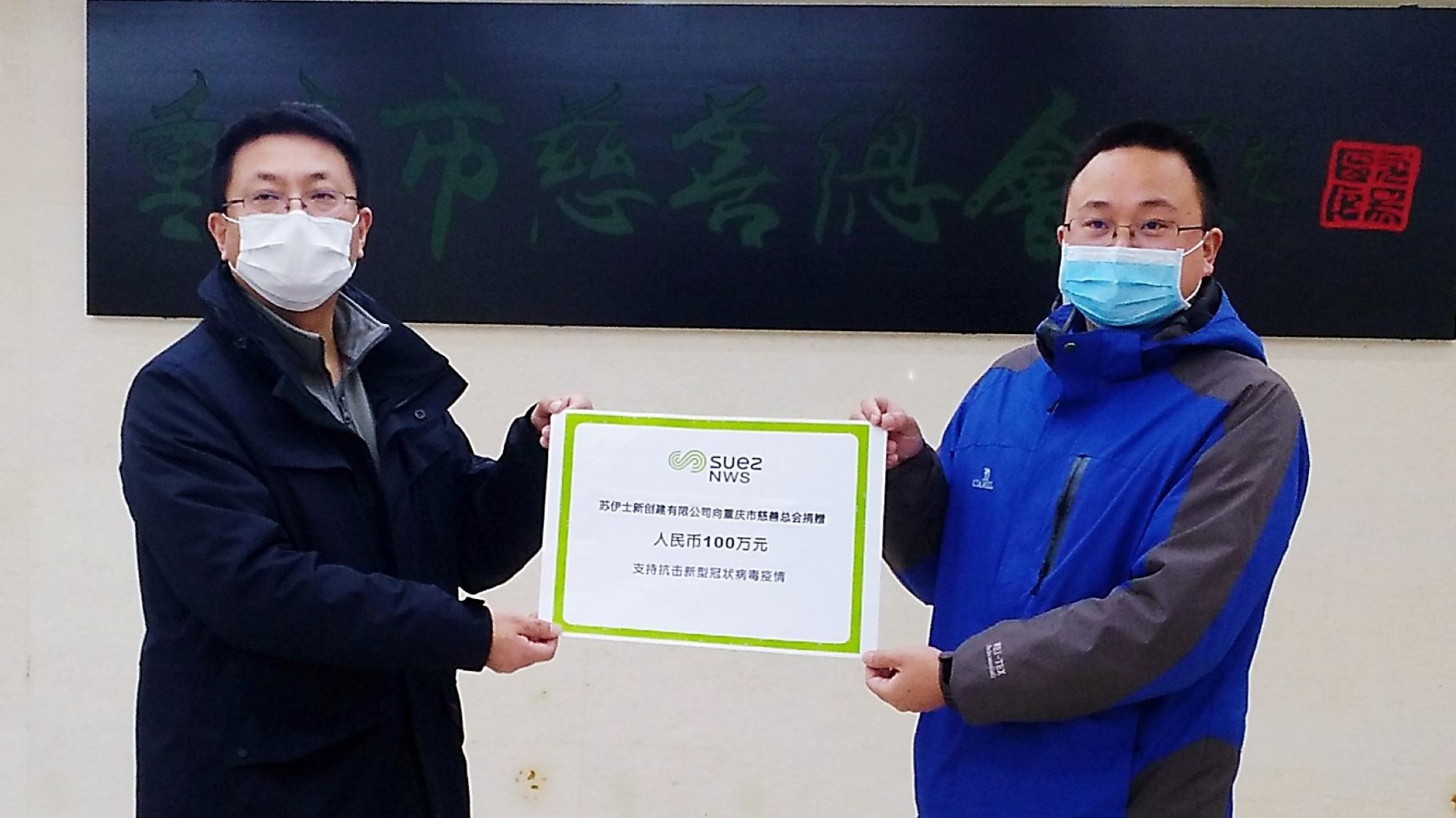COVID-19
SUEZ NWS pledges full support to China’s efforts to fight COVID-19 epidemic
Since the outbreak of the COVID-19 epidemic, SUEZ NWS has swiftly implemented a series of measures to ensure the safety and reliability of its water supply, as well as its waste collection and wastewater treatment services across China. The company has also made charitable donations to Wuhan, Chongqing and Qidong, among other cities. In addition, the SUEZ Group has leveraged its global reach and partnered with peers and local governments to source emergency supplies of medical and protective equipment, such as masks and protective suits, from around the world. The Group has also mobilized employees to volunteer for local communities.
Safe, reliable water supply: SUEZ NWS is sparing no effort to ensure that services remain uncompromised. Furthermore, in terms of service continuity and operational stability, SUEZ has a track record of over two decades of running unmanned operations in Macao. During the current epidemic, SUEZ will fully demonstrate the robustness of its water plant automation, risk management and emergency response measures. Similar models have proven effective in water plants in Shanghai Chemical Industry Park, Chongqing, and Tanzhou. Water quality control: Disinfection protocols in water production are being strictly enforced during these extraordinary times. The removal of bacteria and viruses during the enhanced purification process ensures that water quality is 100% compliant with drinking water standards. Customer service: Macao Water is working with the Macao SAR government to extend the billing cycle for water users. Chongqing Water has also committed to levy no penalties on default payment of water fees during the epidemic. It will also not cut off water supply to customers who default.
Wastewater and sludge treatment: SUEZ NWS has adopted an additional number of rigorous process parameters to match the changes in water usage and raw water profiles. In light of in-process risk factors like solid waste storage in wastewater treatment plants (WWTPs), surface exposure of biochemical processes, and sludge treatment systems, SUEZ NWS has enforced a more stringent personal protection policy and taken comprehensive measures that include adding disinfectants, ultraviolet radiation and ozone processes to further remove bacteria and viruses in the effluence, and to ensure that fecal coliform bacterial concentrations meet discharge standards.
Hazardous waste and medical waste treatment: SUEZ NWS has scheduled its activities in strict accordance with local government requirements. SCIP SITA is collecting and incinerating discarded masks in centralized depositaries, to prevent secondary hazards. Nantong Recycling and Recovery is treating solid waste as it arrives. Alongside consistent enforcement of existing processes, special medical waste generated during the epidemic is now subject to a series of emergency protocols, including three layers of packaging, separate storage and transfer, logging and escort by dedicated staff. It is also subject to priority disposal. Each medical waste recycling box is thoroughly cleaned and disinfected to ensure that waste is promptly, efficiently and harmlessly disposed of in a timely fashion to stop onward transmission of the virus.
Municipal sanitation: SUEZ NWS provides 24/7 uninterrupted services in Hong Kong and Macao, and has intensified disinfection efforts at waste collection points, customs ports and immigration checkpoints.
Wastewater and sludge treatment: SUEZ NWS has adopted an additional number of rigorous process parameters to match the changes in water usage and raw water profiles. In light of in-process risk factors like solid waste storage in wastewater treatment plants (WWTPs), surface exposure of biochemical processes, and sludge treatment systems, SUEZ NWS has enforced a more stringent personal protection policy and taken comprehensive measures that include adding disinfectants, ultraviolet radiation and ozone processes to further remove bacteria and viruses in the effluence, and to ensure that fecal coliform bacterial concentrations meet discharge standards.
Hazardous waste and medical waste treatment: SUEZ NWS has scheduled its activities in strict accordance with local government requirements. SCIP SITA is collecting and incinerating discarded masks in centralized depositaries, to prevent secondary hazards. Nantong Recycling and Recovery is treating solid waste as it arrives. Alongside consistent enforcement of existing processes, special medical waste generated during the epidemic is now subject to a series of emergency protocols, including three layers of packaging, separate storage and transfer, logging and escort by dedicated staff. It is also subject to priority disposal. Each medical waste recycling box is thoroughly cleaned and disinfected to ensure that waste is promptly, efficiently and harmlessly disposed of in a timely fashion to stop onward transmission of the virus.
Municipal sanitation: SUEZ NWS provides 24/7 uninterrupted services in Hong Kong and Macao, and has intensified disinfection efforts at waste collection points, customs ports and immigration checkpoints.
Not only did SUEZ NWS staff compassionately give donations, the company has also partnered with peers and local governments to source emergency supplies of medical and protective equipment like masks and protective suits from around the world through its global procurement network.
Learn more about our actions worldwide to ensure continuity of essential public services on the global website suez.com


